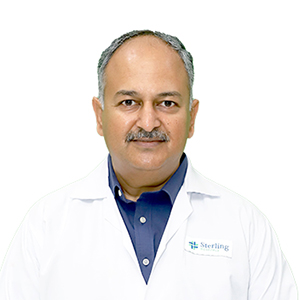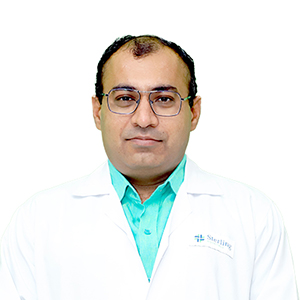Haematology & Haemato-Oncology
Clinical Haematology is a medical specialty that involves the diagnosis and treatment of blood disorders, including conditions such as iron deficiency and leukemia. This branch of medicine is focused on the study of blood and the organs involved in its production, as well as the diseases associated with them. Haematology encompasses the treatment of all the components and organs responsible for blood production, such as blood cells, bone marrow, haemoglobin, proteins in blood, spleen, blood vessels, and platelets.
At Sterling Hospitals Sindhu Bhavan, Ahmedabad, our hematology specialists are well-versed in the diagnosis and treatment of both blood cancers and non-cancerous blood disorders. They have the expertise to deal with the most common to the rarest hematologic diseases and utilize the latest technology and information to ensure accurate diagnoses. Our specialists work closely with patients to provide personalized care and create effective treatment plans.
At Sterling Hospitals Sindhu Bhavan, Ahmedabad, our Haematology Department provides a comprehensive range of services, including outpatient clinics, inpatient daycare facilities, laboratories, and blood banks We also have a team of highly qualified doctors specializing in blood cancer, making us the best bone marrow transplant center and the best blood cancer hospital in Ahmedabad.
Conditions We Treat
- Acute Leukaemia is a type of cancer that affects the white blood cells and progresses rapidly. Symptoms can include fatigue, fever, easy bruising or bleeding, and frequent infections. Treatment may include chemotherapy, radiation therapy, or bone marrow transplantation.
- Chronic Leukaemia is a type of cancer that affects the white blood cells and progresses slowly. It may not cause symptoms for years and can be detected through routine blood tests. Treatment options may include targeted therapy or supportive care such as blood transfusions.
- Plasma Cell Disorders are a group of diseases that affect the plasma cells, which produce antibodies to help fight infections. Examples include multiple myeloma and Waldenstrom macroglobulinemia. Treatment may include chemotherapy, radiation therapy, or targeted therapy.
- Lymphoma - Hodgkin / Non-Hodgkin are cancers that affect the lymphatic system, which is responsible for fighting infections. Hodgkin lymphoma and Non-Hodgkin lymphoma are two main types of lymphoma. Treatment options may include chemotherapy, radiation therapy, or targeted therapy.
- Myeloproliferative Neoplasms are a group of diseases that cause the bone marrow to produce too many blood cells. Examples include polycythemia vera, essential thrombocythemia, and myelofibrosis. Treatment may include medication or blood transfusions.
- Thalassemia and other haemoglobinopathies are inherited blood disorders that affect the production of haemoglobin, the protein in red blood cells that carries oxygen. Thalassemia and sickle cell anemia are examples of hemoglobinopathies. Treatment may include blood transfusions or medication to manage symptoms.
- All types of coagulation and thrombotic disorders are conditions that affect the ability of the blood to clot properly or increase the risk of abnormal blood clots. Examples include deep vein thrombosis, pulmonary embolism, and hemophilia. Treatment may include blood thinners or medication to prevent blood clots.
- Haemoglobin and platelet disorders are conditions that affect the production or function of haemoglobin or platelets, which are involved in blood clotting. Examples include thrombocytopenia and von Willebrand disease. Treatment may include medication or blood transfusions to manage symptoms.
Common Procedures
Chemotherapy - the use of drugs to kill cancer cells.
Chemotherapy is a treatment method that uses drugs to kill cancer cells in the body. In haemato-oncology (the study and treatment of blood cancers and related conditions), chemotherapy is often used as the primary treatment approach.
Intensive chemotherapy is a type of treatment that involves giving high doses of chemotherapy drugs over a relatively short period of time. It is often used for aggressive blood cancers, such as acute myeloid leukemia (AML) and acute lymphoblastic leukemia (ALL). Intensive chemotherapy can be challenging for patients as it can cause more severe side effects, such as nausea, vomiting, and fatigue. However, it may offer a better chance of curing the cancer.
Non-intensive chemotherapy, on the other hand, involves giving lower doses of chemotherapy drugs over a longer period of time. This approach is often used for less aggressive blood cancers, such as chronic lymphocytic leukemia (CLL) and follicular lymphoma. Non-intensive chemotherapy is generally more tolerable for patients, with fewer and less severe side effects.
The choice between intensive and non-intensive chemotherapy depends on various factors, including the type and stage of the cancer, the patient's age and overall health, and the treatment goals. Treatment plans are usually developed by a team of specialists, including hematologists, oncologists, and other healthcare professionals, to determine the best course of action for each individual patient.
Radiation therapy - the use of high-energy radiation to kill cancer cells.
Radiation therapy, also known as radiotherapy, is an effective treatment option that uses high-energy radiation to kill cancer cells in the body. This treatment works by damaging the DNA of cancer cells, which stops them from growing and dividing.
At Sterling Hospitals Sindhu Bhavan, Ahmedabad, we offer radiation therapy as part of a comprehensive treatment plan for blood cancers, such as leukemia and lymphoma. Depending on the type and stage of the cancer, radiation therapy may be used in combination with chemotherapy or as a standalone treatment. Our team of hematologists/oncologists will carefully evaluate each patient's individual needs and circumstances to determine the best course of treatment.
Radiation therapy is commonly used for localized lymphomas, including early-stage Hodgkin's lymphoma and non-Hodgkin's lymphoma. It can also be used to treat bone marrow involvement in leukemia or lymphoma.
During radiation therapy, high-energy radiation is delivered to the body from a machine outside of the body. Treatment typically takes place over several weeks, with the length and frequency of treatment sessions varying based on the cancer being treated.
While radiation therapy can cause side effects, such as fatigue, skin changes, and nausea, our team of healthcare professionals is experienced in managing these side effects with medication and other supportive therapies.
Overall, radiation therapy can be a highly effective treatment option for blood cancers when used appropriately as part of a comprehensive treatment plan. Contact us at Sterling Hospitals Sindhu Bhavan, Ahmedabad to learn more about our radiation therapy services and how we can help you or your loved one in the fight against cancer.
Immunotherapy
Immunotherapy is an innovative type of cancer treatment that utilizes the body's own immune system to fight cancer. In haemato oncology, immunotherapy has become an important treatment option for various types of blood cancers, such as leukemia, lymphoma, and multiple myeloma.
At Sterling Hospitals Sindhu Bhavan, Ahmedabad, we offer a range of immunotherapy treatments to our patients, including monoclonal antibodies, checkpoint inhibitors. Our team of experienced hematologists/oncologists will evaluate each patient's individual needs and circumstances to determine the most appropriate course of treatment.
Immunotherapy works by targeting specific proteins or markers on cancer cells that help them evade the immune system's detection. By blocking these proteins or markers, immunotherapy can help the immune system recognize and attack cancer cells.
Immunotherapy can be used in combination with other treatments, such as chemotherapy or radiation therapy, or as a standalone treatment. The decision to use immunotherapy will depend on various factors, including the type and stage of the cancer, the patient's overall health, and the treatment goals.
While immunotherapy can cause side effects, such as fatigue, fever, and muscle aches, our team of healthcare professionals is experienced in managing these side effects with medication and other supportive therapies.
Overall, immunotherapy has shown promising results in the treatment of various blood cancers, and ongoing research is exploring new ways to use this treatment approach to improve outcomes for patients. Contact us at Sterling Hospitals Sindhu Bhavan, Ahmedabad to learn more about our immunotherapy services and how we can help you or your loved one in the fight against cancer.
Targeted therapy
Targeted therapy is a type of cancer treatment that uses drugs to target specific proteins or genes that are involved in the growth and survival of cancer cells. This type of therapy has become an important treatment option for various types of blood cancers, such as leukemia, lymphoma, and multiple myeloma.
Targeted therapy works by blocking the activity of these proteins or genes. This can be done through the use of small molecule inhibitors or monoclonal antibodies. Small molecule inhibitors are drugs that can block the activity of specific proteins inside cancer cells, while monoclonal antibodies are laboratory-made proteins that can attach to specific proteins on cancer cells and block their activity.
Targeted therapy can be used in combination with other treatments, such as chemotherapy or immunotherapy, or as a standalone treatment. The decision to use targeted therapy will depend on various factors, including the type and stage of the cancer, the patient's overall health, and the treatment goals.
Like other cancer treatments, targeted therapy can cause side effects, such as nausea, diarrhea, and skin rash. However, these side effects are usually temporary and can be managed with medication or other supportive therapies.
Overall, targeted therapy has shown promising results in the treatment of various blood cancers, and ongoing research is exploring new ways to use this treatment approach to improve outcomes for patients.
At Sterling Hospitals Sindhu Bhavan, Ahmedabad, our team of hematologists/oncologists is experienced in using targeted therapy to provide personalized treatment options for our patients.
Stem cell transplantation
Stem cell transplant, also known as bone marrow transplant, is a medical procedure that replaces a patient’s damaged or diseased bone marrow with healthy stem cells. This treatment is commonly used in the treatment of various blood cancers, such as leukemia, lymphoma, and multiple myeloma.
- How stem cell transplant works?
Stem cell transplant works by first destroying the patient’s diseased bone marrow with high-dose chemotherapy and/or radiation therapy. Once the diseased bone marrow is destroyed, healthy stem cells are transplanted into the patient’s body, where they can begin to produce new blood cells.
Types of stem cell transplant
- Allogeneic transplant: This type of transplant uses stem cells from a donor. The donor can be a matched sibling, an unrelated donor, or the patient’s umbilical cord blood.
- Autologous transplant: This type of transplant uses the patient’s own stem cells. The stem cells are collected from the patient’s bone marrow or blood before the patient undergoes chemotherapy or radiation therapy.
The risks of stem cell transplant
Stem cell transplant is a complex procedure that carries risks, including:
- Infection
- Bleeding
- Graft-versus-host disease (GVHD)
- Death
The benefits of stem cell transplant
Stem cell transplant can be an effective treatment for certain blood cancers. It can also be used to treat other conditions, such as aplastic anemia and sickle cell disease.
Stem cell transplant is a complex procedure that requires specialized expertise and infrastructure. It is typically performed at a hospital or clinic that has a stem cell transplant program.
If you or a loved one has been diagnosed with a blood cancer, talk to your doctor about stem cell transplant. Sterling Hospitals Sindhu Bhavan, Ahmedabad is a leading hospital in India that offers stem cell transplant services. Our team of experts is committed to providing the highest quality care to our patients.
Blood transfusions
Blood transfusions are a common treatment for patients with blood cancers or other blood disorders, such as anemia. At Sterling Hospitals Sindhu Bhavan, Ahmedabad, we provide comprehensive blood transfusion services to our patients with the highest level of care and safety.
A blood transfusion is a medical procedure that involves transferring blood or blood products from a donor into a patient's bloodstream. The donated blood can be used to replace blood cells that have been lost due to disease or injury, to improve the patient's ability to carry oxygen, or to boost the patient's immune system.
Blood transfusions can be given as a one-time treatment or on a regular basis, depending on the patient's needs. Our team of hematologists/oncologists will work with each patient to determine the appropriate blood transfusion regimen based on their diagnosis and individual needs.
At Sterling Hospitals Sindhu Bhavan, Ahmedabad, we have a state-of-the-art blood bank that follows strict safety protocols to ensure the safety and quality of donated blood. Our experienced transfusion team will carefully match each patient's blood type with the donated blood to minimize the risk of transfusion reactions or other complications.
In addition to blood transfusions, we also offer other blood products, such as platelets and plasma, to our patients when needed.
If you or a loved one requires blood transfusion services for a blood cancer or other blood disorder, our team at Sterling Hospitals Sindhu Bhavan, Ahmedabad is here to provide the highest level of care and support throughout your treatment journey.
Supportive care
At Sterling Hospitals Sindhu Bhavan, Ahmedabad, we understand that the treatment of blood cancers can be challenging and may cause physical, emotional, and psychological side effects. That's why we offer a comprehensive range of supportive care services to help our patients manage their symptoms and improve their quality of life.
Our supportive care services are designed to provide personalized care to each patient based on their individual needs. We offer a range of supportive care services, including:
- Pain management: Pain is a common symptom associated with blood cancers and their treatments. Our team of specialists is trained in the latest pain management techniques to help our patients manage their pain effectively and comfortably.
- Nutrition support: Proper nutrition is essential for patients undergoing treatment for blood cancers. Our nutritionists work closely with each patient to develop a personalized nutrition plan that meets their individual needs and preferences.
- Emotional and psychological support: Coping with a blood cancer diagnosis can be overwhelming and stressful. Our team of counsellors and social workers is available to provide emotional and psychological support to our patients and their families throughout their treatment journey.
- Palliative care: Palliative care focuses on improving the quality of life for patients with serious illnesses, including blood cancers. Our palliative care team works with our patients to manage their symptoms and provide comfort care throughout their treatment.
- Rehabilitation services: Blood cancer treatments can cause physical limitations and impairments. Our team of physical therapists and occupational therapists is available to help our patients maintain their mobility and independence throughout their treatment.
At Sterling Hospitals Sindhu Bhavan, Ahmedabad, we are committed to providing the highest level of care and support to our patients with blood cancers. Our supportive care services are an integral part of our comprehensive treatment approach, and we work closely with each patient to ensure that their individual needs are met.

















